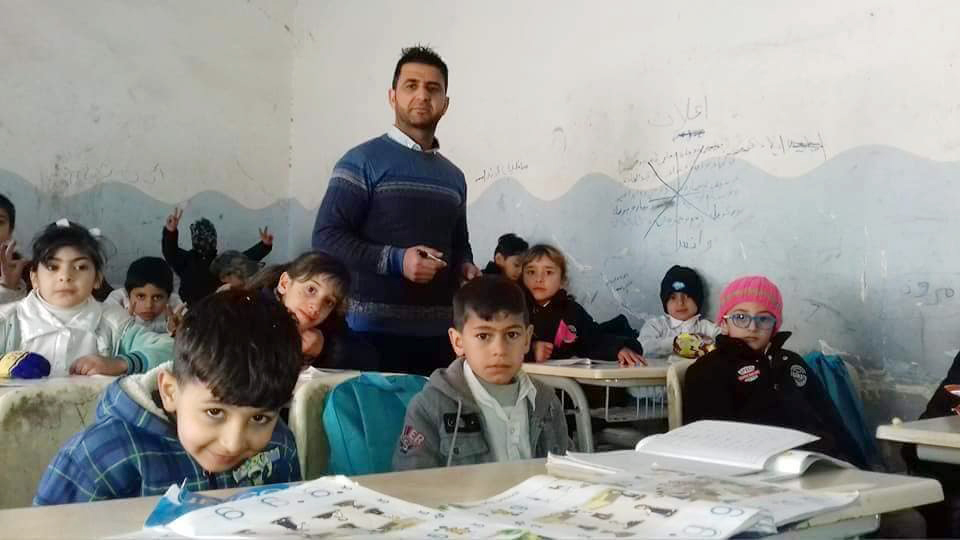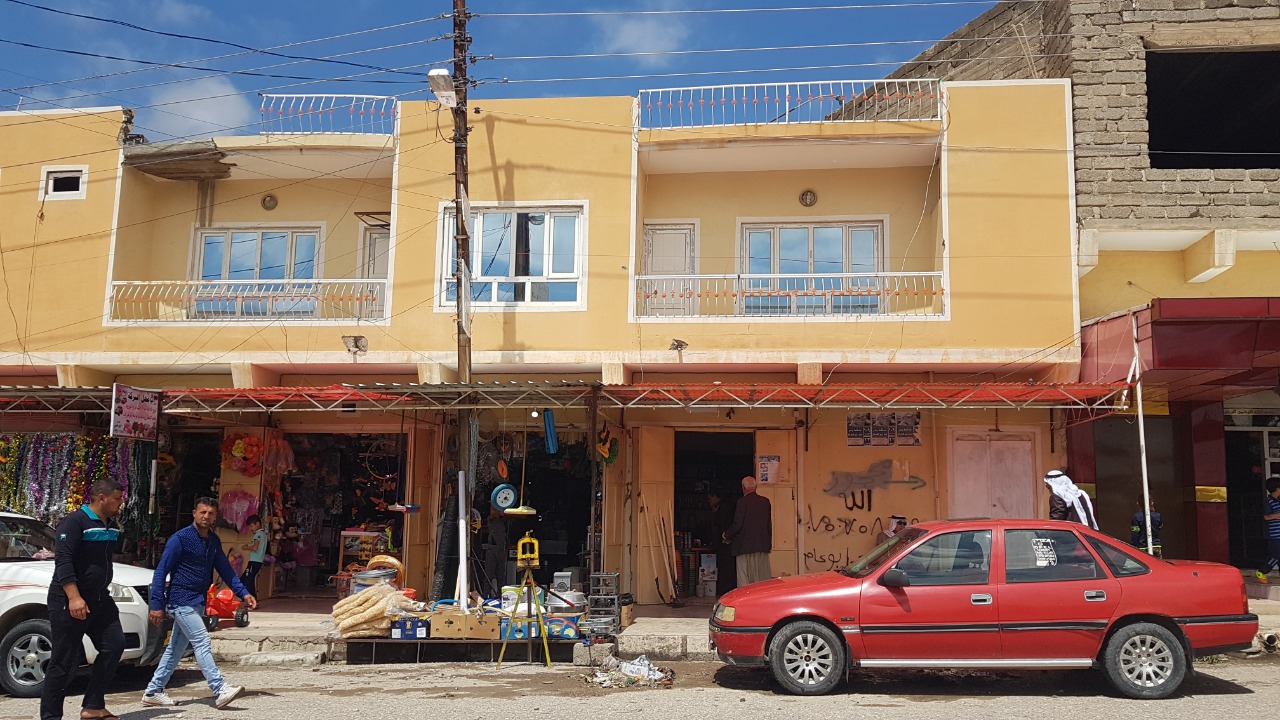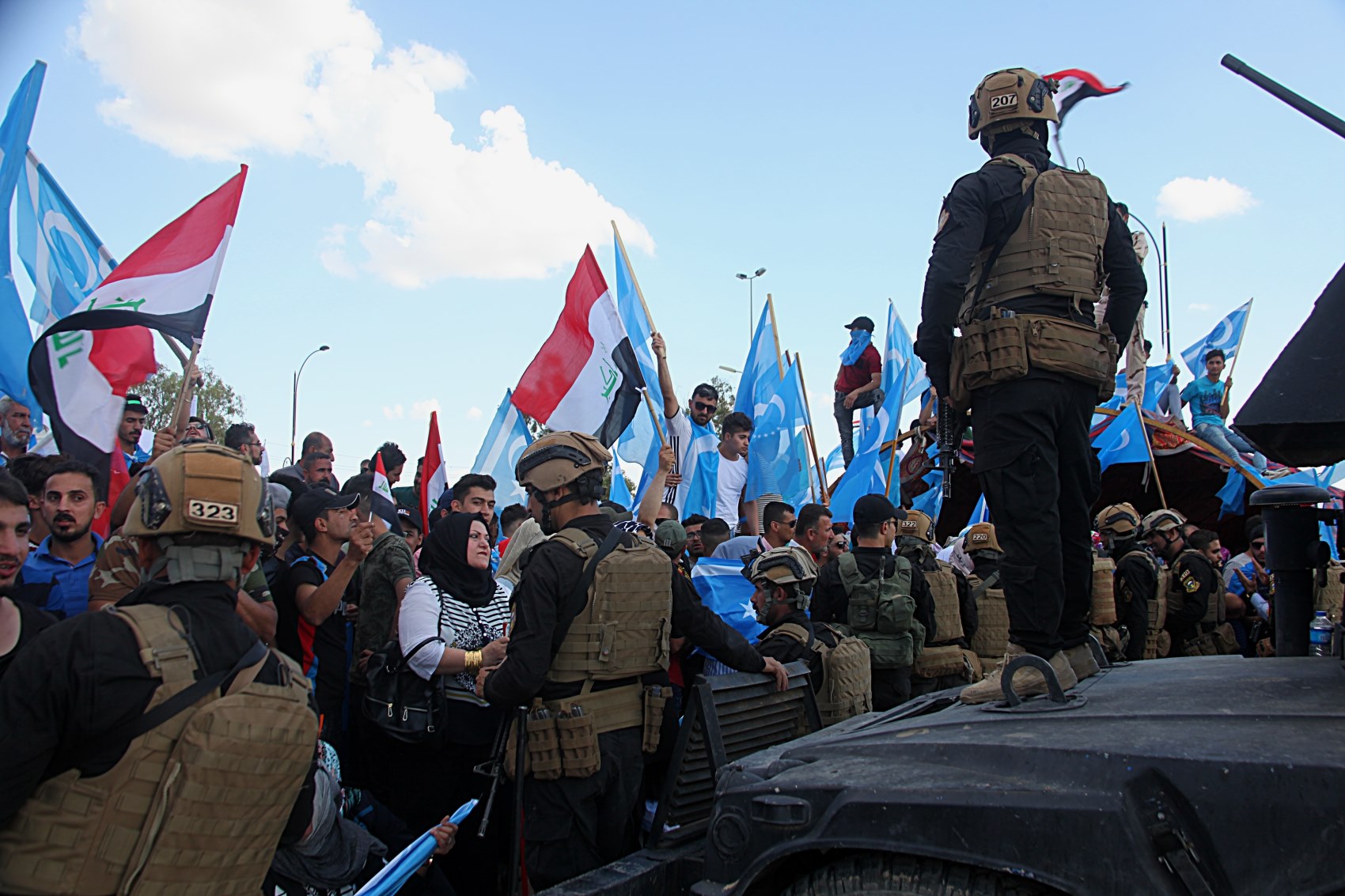“It is very unfortunate that the community does not know the mother tongue,” said Raza Julaq Oglu, a prominent Turkmen poet and expert in Turkmen traditions.
Oglu added despondently, “the Turkmen of Tal Afar have no apparent enthusiasm to learn the mother tongue, so the Turkmen language is on the edge of extinction due to the lack of institutional support to solve the issue. There is only individual support, which is not sufficient.”
The Turkmen language is on the edge of extinction due to the lack of institutional support to solve the issue
The Turkmen community is the third largest ethnic group in Iraq behind Arabs and Kurds, and it is dispersed across Iraq’s disputed territories, which are claimed by both the federal and regional government. The ethnic group constitutes a majority of the population in Tal Afar, a district in western Nineveh province.
Experts believe that their language is facing significant challenges, including the common usage of other languages, displacement, dominance of other cultures, and the use of an alphabet that is different from standard Turkish.
Preserving grammar and dialect
Oglu explained to KirkukNow, “the Turkmen of Tal Afar are likely to forget most of the distinguishing features of their dialect.” Meanwhile, they have yet to learn fundamentals of reading and writing in their language. The few exceptions include Turkmen students who have studied in Turkey.
The Turkmen of Tal Afar are likely to forget most of the distinguishing features of their dialect
“Even the poets who write in the Turkmen language make the same mistakes because of their lack of familiarity with the dialect and grammar, as well as their lack of full exposure to the modern Turkish language. This is because they neither have expertise in Ottoman writings, nor in modern Turkish language,” Oglu claimed.

Nineveh, a Turkmen school in Tal Afar, 2018. Photo: Education Directorate of Tal Afar
According to Miqdad Hudi, head of Tal Afar Writers Union, Turkmen intellectuals and poets in Tal Afar have been devoted to the preservation of their mother tongue since the 1980s because language defines the identity of a people, and a people may be eradicated through the eradication of the its language, .
“The preservation of Turkmen language should be the priority for the Turkmen of Tal Afar. It is unfortunate that our children do not know their mother tongue fluently in addition to the language they study at school because this is not the language they use to communicate,” said Hudi.
It is unfortunate that our children do not know their mother tongue fluently
He added, “more than 100 poets write in the Turkmen language, but when you read their poetry critically, especially that of the younger poets, you see they have turned to non-Turkmen words instead of using their mother tongue.”
The relationship between Turkmen and Turkish language
The experts consider the relationship between the Turkmen and the Turkish language to be analogous to that between Arabic al-Fusha-the classical or original Arabic language, and al-'Ameya, the locally spoken form of the language. They believe that Turkmen and Turkish language are close, but historical and geographical circumstances have resulted in a divergence between dialects, especially with regards to the variety of the alphabets, vocabularies, and expressions.
The shift from the Arabic script of Ottoman Turkish to Latin alphabet transformed the Turkish language after the latter was implemented in Turkey in 1928. Meanwhile, the Iraqi Turkmen, including the Turkmen of Tal Afar, continued writing in Arabic script. This has been another challenge for the Turkmen language in Iraq.
After 1991, the study of Turkish in the Latin alphabet as part of the Iraqi Turkmen school curriculum was accepted and supported by those who regarded Turkish it as the “pure’ Turkic language. But the unresolved conflict between those who accept and those who reject Turkish instruction continues to generate controversy.
“Originally, Turkish and Turkmen were one language, they only have different dialects. That is why the Azeri language is close to the Iraqi Turkmen dialect, especially to the dialect of Turkmen in Tal Afar,” poet Ihsan Burja said.
Turkish and Turkmen were one language
Burja added, “the Turkish language has been modernized with regards to grammar and the transition from Arabic to Latin alphabets, but the Turkmen language in Iraq has remained as it was, without any grammatical rules. This is the reason why those living in Tal Afar cannot write and read proficiently in their mother tongue.”
Burja compared the poetry written by classic poets such as Falak Oglu and Mula Mahmood to poetry of the new poets: “There are significant differences, to the extent that I can say that the Tal Afar dialect has been completely lost.”
The lack of Turkmen schools
Experts draw attention to the lack of Turkmen schools, with only one Turkmen school in Tal Afar, a district with a population estimated at 250,000 people.

Nineveh, local shops in Tal Afar, 2020. Photo: Jaafar Tal Afari
Abdul-Ghani Alyas Abbas, a scholar of the Turkmen language, explained that the study of Turkmen was introduced into Tal Afar schools in 2005 by the Ministry of Education in two ways: first, Turkmen language instruction (with Latin alphabet) in all subjects except for Arabic and Islamic theology courses.
This year a Turkmen school, called Bayrak, was opened in Tal Afar’s Hasankawi. 13 students are enrolled at the school.
Before the takeover of Tal Afar by the Islamic State group (IS) in 2014, there were six Turkmen schools in the district, five of which were located in the center of the district and the sixth located in Ayaziya sub-district, with a total of 700 students. But the advance of the Islamic State resulted in the displacement of the Turkmen people and the closure of the schools.
The second way that the Turkmen language is being advanced, Abbas explained, is through “partial Turkmen studies, in which two hours per week are devoted to study in the mother tongue at the all levels of education; kindergarten, elementary, secondary, and high school. Such a program has been implemented in all Tal Afar schools.
“Still, we do not witness much development in Turkmen language education because there are few subjects offered in Turkmen language and there is a lack of teachers with expertise in Turkish, which has resulted in the decline of the quality of the education.”
Abbas has asked that parents to “motivate their children to study at the Turkmen schools because they are official and their programs are accredited by the Ministry of Education.” He also wants children to be registered in language courses and has called for “the inscription of the names of neighborhoods and traffic signs in Turkmen and changing the names of streets and shops to Turkmen names”.
He added that the parents should try to communicate with their children only in the Turkmen language and that there should be an effort to publish magazines and newspapers that raise awareness about the importance of the preserving the mother tongue so that “this beautiful language does not become extinct.”
On September 9, 2019, the educational colleges in Kirkuk and Nineveh, where majority of Turkmen in Iraq reside, announced the opening of Turkmen language departments.
Article Four of Iraq’s constitution preserves the Turkmen community’s right to educate its children in the group’s mother tongue.
With regards to the Turkmen language’s constitutional status, poet Ihsan Burja said, “there is no legal barrier to implementing the constitution, which gives Turkmen the right to study in their mother tongue alongside the Arabic language in their areas.”
“Exercising such a right requires setting up a curriculum, placing importance on arranging seminars and workshops, and launching awareness campaigns.”
Displacement has further weakened the language
“My children cannot speak Turkmen fluently and use other words which they have learned from their interactions with children from other ethnic groups in displacement,” said Anwar Hussein, describing the level of proficiency at which her children communicate in their native language.

A school in Tal Afar, 2020. Photo: Jaafar Tal Afari
Anwar, who is 40 years old, moved from Tal Afar to Baghdad because she prefers living in the capital until the situation is stable in her district.
Tal Afar fell under IS control in June 2014, resulting in the mass displacement of its estimated 225,000 inhabitants, who migrated to the central provinces and the Kurdistan Region. Many also migrated to Turkey. Since Iraqi forces retook the district from IS in 2017, 45 percent of its residents have returned to their hometown.
Arabization policy and the influence of technology on the language
Miqdad Hudi Oglu, head of Tal Afar Writers Union, recalled how Arabization the Arabic language were imposed on Tal Afar during the former Baath regime, led by Saddam Hussein. But Turkmen in those days were more proficient in their language than they are now, and succeeded in preserving the it.
He also described the influence of technology on the language: “The advancement of technology has had a role in causing Turkmen to forget their mother tongue, along with the predominance of Arabic-language television as well as on the social media platforms.”
The advancement of technology has had a role in causing Turkmen to forget their mother tongue
Oglu further explained the challenges of promoting Turkmen language use: “if the situation remains the same, then significant changes will happen to our language, which is the most prominent feature of our identity.”
Oglu believes that steps should be taken to preserve the Turkmen community’s culture for the future: “We really need to start documenting the dialects of Turkmen language and the culture we have in Tal Afar, which a responsibility all of us have.”





